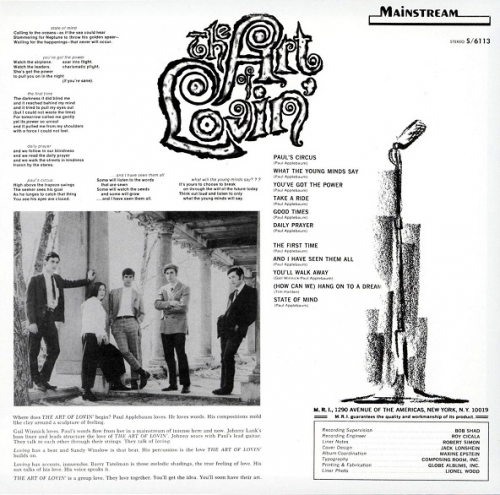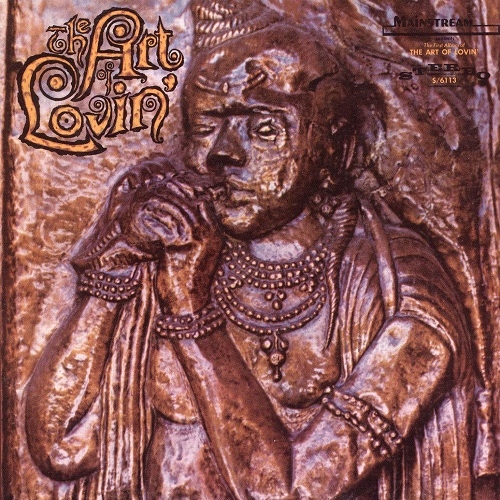
The Art Of Lovin' - The Art Of Lovin' (Reissue) (1968/2012)
BAND/ARTIST: The Art Of Lovin'
- Title: The Art Of Lovin'
- Year Of Release: 1968/2012
- Label: Mainstream Records
- Genre: Psychedelic Rock
- Quality: Flac (tracks)
- Total Time: 33:03
- Total Size: 206 Mb (scans)
- WebSite: Album Preview

Tracklist:
01. Paul's Circus 3:15
02. What The Young Minds Say 2:40
03. You've Got The Power 3:01
04. Take A Ride 3:07
05. Good Times 2:32
06. Daily Prayer 2:52
07. The First Time 3:31
08. And I Have Seen Them All 3:14
09. You'll Walk Away 2:27
10. (How Can We) Hang On To A Dream 2:47
11. State Of Mind 3:37
Line-up::
Vocals, Guitar – Paul Applebaum
Vocals – Gail Winnick
Bass – Johnny Lank
Drums, Percussion – Sandy Winslow
Saxophone – Barry Tatelman
Written-By – Gail Winnick (tracks: 9), Paul Applebaum (tracks: 1 to 9, 11), Tim Harden (tracks: 10)
Engineer – Roy Cicala
Mastered By – Kenichiro Tsukasaki
Recording Supervisor – Bob Shad
The Bosstown Sound (or Boston Sound) was the catchphrase of a marketing campaign to promote psychedelic rock and psychedelic pop bands in Boston, Massachusetts, in the late 1960s. The concept was conceived by the record producer Alan Lorber as a marketing strategy intended to establish several underground musical artists native to the city on the national charts and compete with the popular San Francisco Sound. Lorber chose Boston for his plan because of the several bands developing in the city, the abundance of music venues (such as the Boston Tea Party), and the proximity of MGM Records, which had signed the core groups.
The Bosstown Sound was promoted as harnessing the hallucinogenic essence of psychedelia, also known at the time as acid rock. Numerous bands were involved, but the groups Ultimate Spinach, the Beacon Street Union, and Orpheus were the most prominent. The Boston music scene briefly captured the interest of the youth culture, and recordings by bands from Boston achieved positions on the Billboard 200 chart. However, by the end of 1969, the campaign faltered, its advertisements rejected by listeners. Critics panned the groups involved, and few of the Bosstown bands survived after the scene collapsed. Opinions are still mixed, but the music of these bands has received more positive assessments in recent years.
The Bosstown Sound was promoted as harnessing the hallucinogenic essence of psychedelia, also known at the time as acid rock. Numerous bands were involved, but the groups Ultimate Spinach, the Beacon Street Union, and Orpheus were the most prominent. The Boston music scene briefly captured the interest of the youth culture, and recordings by bands from Boston achieved positions on the Billboard 200 chart. However, by the end of 1969, the campaign faltered, its advertisements rejected by listeners. Critics panned the groups involved, and few of the Bosstown bands survived after the scene collapsed. Opinions are still mixed, but the music of these bands has received more positive assessments in recent years.
Music | Oldies | Rock | FLAC / APE
As a ISRA.CLOUD's PREMIUM member you will have the following benefits:
- Unlimited high speed downloads
- Download directly without waiting time
- Unlimited parallel downloads
- Support for download accelerators
- No advertising
- Resume broken downloads


